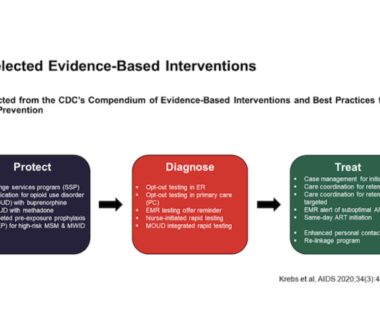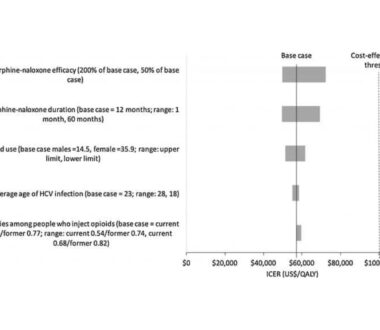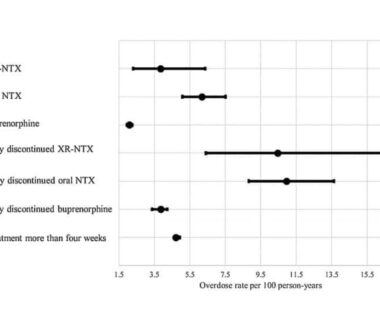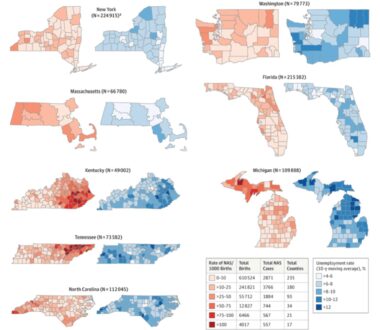
COVID-19 Can Change The Way We Respond To The Opioid Crisis – For The Better
The Coronavirus (COVID-19) pandemic has brought unprecedented challenges in healthcare delivery to people who use drugs. However, it may also have provided impetus to precipitate innovative changes in providing opioid overdose prevention, syringe services, and medication for opioid use disorder (MOUD) to this vulnerable population. In a new Viewpoint in Psychiatric Services, CHERISH Research Affiliate Yuhua Bao from […]

Optimizing HIV Prevention in Six US Cities: An Economic Model
In 2019, the United States launched the effort to End the HIV Epidemic by reducing new infections by 75% within 5 years and by 90% within 10 years. This national strategy comes with some new funding for the Centers of Disease Control and Prevention (CDC), the Health Resources and Services Administration (HRSA), and the Ryan White HIV/AIDS […]

Overdose and Re-hospitalization Rates Following Endocarditis Are Lower for Patients Receiving Medications for Opioid Use Disorder
The proportion of hospital admissions for endocarditis attributable to injection drug use increased from 7% in 2000 to 12% in 2013. Endocarditis is an infection in the lining of the heart chambers and valves that can be contracted through shared injection equipment. Rates of endocarditis are disproportionately affecting young people who inject drugs (PWID), which has […]

Will Eliminating Waiver Requirements Improve Access to Buprenorphine for Treating Opioid Use Disorder? Evidence From Increasing the Patient Treatment Cap
The Drug Addiction Treatment Act of 2000 (DATA 2000) permits qualified physicians to obtain a waiver to treat patients with opioid use disorder (OUD) with buprenorphine in office-based practices. In 2016, 47% of all US counties and 72% of rural counties lacked a buprenorphine waivered physician. That year, the Comprehensive Addiction and Recovery Act extended buprenorphine prescribing […]

Hospital Financial Incentives to Improve Care After Opioid Overdose
Early analysis of Pennsylvania’s program Two patients are treated for opioid overdose at two different hospitals, just a few miles apart. The first hospital provides life-saving treatment to reverse the overdose and watches the patient for an hour, discharging them when deemed “medically stable.” The second hospital also provides life-saving treatment but then offers counseling, […]

Methodology Consultation Success Story: Dr. Ashish Premkumar
The incidence of neonatal abstinence syndrome (NAS), also known as neonatal withdrawal syndrome, increased nationally from 3.4 per 1000 hospital births in 2009 to 5.8 in 2012. Recent estimates of NAS cost $1.5 billion dollars with the majority of the financial burden falling to state Medicaid programs. However, pregnancy offers a unique opportunity for women with […]

Revisions to 42 CFR Patient Confidentiality Rules for Substance Use Disorder: What It Means for Health Services Researchers
In August 2019 the United States Substance Abuse and Mental Health Services Administration (SAMHSA) proposed a revision to the Federal rule that protects patient confidentiality for people with substance use disorders, referred to as 42 CFR Part 2. The sixty day comment period has ended and comments are currently under consideration. This proposal seeks to facilitate disclosure […]

Achieving Value in Substance Use Disorder Treatment: Paying for What Works (and Not Paying for What Doesn’t): Workshop Summary
More than 100 policymakers, practitioners, and researchers discussed and debated how payment policy can promote evidence-based, cost-effective substance use disorder treatment, in a recent workshop hosted by the Center for Health Economics of Treatment Interventions for Substance Use Disorder, HCV and HIV (CHERISH) and the Leonard Davis Institute of Health Economics at the University of […]

CHERISH Workshop Addresses an ‘Unfortunate Reality’ of the Addiction Treatment Industry
Funded by the National Institute on Drug Abuse and established in 2015, CHERISH is a five year collaboration of researchers from the Leonard Davis Institute of Health Economics (LDI) of the University of Pennsylvania, Weill Cornell Medical College, Boston Medical Center, and the University of Miami. Their work is focused on studying the health economics […]

Care Integration of Hepatitis C and Opioid Use Disorder Treatment is Cost-Effective and Improves Health Outcomes
People who inject drugs (PWID) often become infected with HIV and hepatitis C virus (HCV). While hepatitis C can be successfully treated with medication, care is often fragmented and rarely integrated within one program or setting. Two recent studies by CHERISH researchers modeled economic and health outcomes for PWID and found evidence of synergistic benefits […]

Buprenorphine for Opioid Use Disorder Lowers Overdose Risk in Commercially Insured Individuals
“Medications for opioid use disorder saves lives.” That’s the title and conclusion of a recent report by the National Academies of Sciences, Engineering and Medicine, based on a review of the scientific evidence. In a new study in Drug and Alcohol Dependence, CHERISH investigators Jake Morgan, Bruce Schackman and Benjamin Linas add to this evidence base by […]

Neonatal Abstinence Syndrome and the Opioid Crisis: Paying Attention to Social Context
As you likely continue to read in your local news or experience in your community, the United States is in the midst of a deadly drug overdose and addiction crisis. In fact, overdoses claimed the lives of 70,000 individuals in 2017—more than two-thirds of those overdoses were linked to opioids. While drug overdoses disproportionately affect young adults, there […]
Engage with CHERISH
Submit a Consultation Request or Contact Us to learn more about how CHERISH can support your research or policy goals.